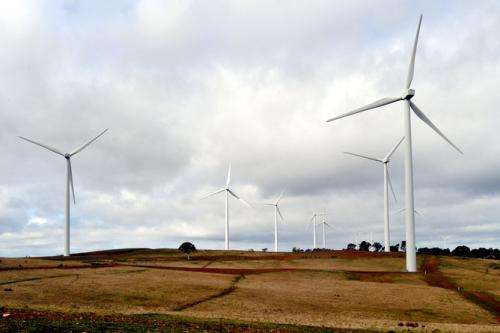Planned cut to renewable energy target 'a free kick' for fossil fuels

The federal government's plan to reduce Australia's Renewable Energy Target (RET) could jeopardise billions of dollars in investment while giving a boost to the fossil fuel sector, experts have predicted.
Industry minister Ian Macfarlane and environment minister Greg Hunt have proposed a reduction in the target, from 41,000 gigawatt hours (GWh) of renewable energy by 2020 to around 27,000 GWh.
The ministers said the reduced target would represent "a real 20% of electricity production in Australia, as was the original bipartisan intent" of the scheme. Declining electricity demand means that the current target represents around 27% of Australia's projected 2020 energy use.
The new proposals stop short of the measures recommended by the Warburton review, which set out a range of options to narrow the existing scheme, including ending all subsidies for new large-scale renewable energy projects and for rooftop solar panels.
Dylan McConnell, a research fellow at the Melbourne Energy Institute, said that "shifting the goalposts will decimate the large-scale renewable industry" and endanger more than A$10 billion of investment.
"Despite what Mr Macfarlane might think, Australia signed up for a 41,000 GWh Large-scale Renewable Energy Target," he said. "Importantly, this is also what the energy industry signed up for."
"The proposed "real 20%" target effectively reduces the existing target by 60% – a substantial disruption to a longstanding, popularly supported and (previously) bipartisan policy," he said.
"There is no technical limit preventing more than 20% renewable energy in a power system, and the fact that 27% might come from renewable sources is something to celebrated, not condemned. In addition, the Warburton review itself showed that the impact of the RET on prices is far from significant, and in fact will deliver lower electricity prices in the long term.
"I find it hard to believe that removing policy that decreases both prices and emissions and increase renewable energy generation is what Australians signed up for."
Tony Wood, energy program director at the Grattan Institute, said a real 20% renewables "always seemed like a reasonable outcome". "But I'm not clear on how this will avoid trashing existing and committed projects," he said.
He also welcomed the government's plan to protect emissions-intensive industries such as aluminium from having to pay subsidies towards renewable energy generation, although he said it was not clear how this would affect the scheme overall.
'Free kick'
Andrew Blakers, director of the Australian National University's Centre for Sustainable Energy Systems, described the new policy as a "free kick for fossil fuels".
"The RET is a specific target: 41,000 GWh by 2020. It is not a percentage. A reduction from 41,000 to 27,000 GWh is a massive impediment to growth of the renewable energy industry, and a corresponding free kick for fossil fuels. Because of the resulting reduction in competition in the wholesale market, the price of electricity would go up, as would carbon emissions," he said.
"In contrast, retention of the RET at 41,000 GWh by 2020 allows Australia to reach more than 90% renewable electricity by 2040 by natural attrition of existing fossil fuel power stations – the deployment rate of wind and solar required to achieve the 2020 RET target is readily achievable, and fast enough to replace each fossil fuel power station in an orderly fashion as it reaches the end of its working life."
Solar subsidies to stay
Mr MacFarlane said the government would not change the financial incentives for installing solar panels, worth about A$2,500 for a typical 3 kilowatt system. The Warburton review recommended that this program, known as the small-scale RET scheme, be brought to an end.
Labor has said it will not support the changes to the large-scale renewables target, which was aimed at brokering a compromise over the RET's future.
The situation will be clouded still further by the confirmation that the government-funded Climate Change Authority will go ahead with plans to produce yet another review of the RET scheme.
Tony Wood applauded the government's move to reduce uncertainty over the scheme by scrapping the requirement for it to be reviewed every two years. But he said there would be a long way to go to reach a clear bipartisan policy.
"There's quite a gap to close and I don't see Labor in any mood to compromise. One has to wonder why we had to go through all the pain of the Warburton review to get here."
Source: The Conversation
This story is published courtesy of The Conversation (under Creative Commons-Attribution/No derivatives).
![]()




















